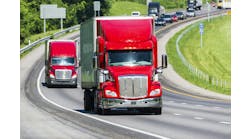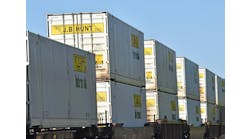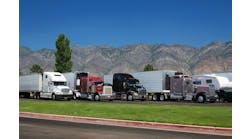The Federal Motor Carrier Safety Administration (FMCSA) has extended the Hours of Service (HOS) relief it granted to truckers hauling goods needed to battle the Coronavirus pandemic adopted in March to July 14—but only for some of the commodities that previously came under the exemption.
The original exemption was scheduled to expire at 11:59 p.m. (ET), June 14. It will be extended to July 14 or until the revocation of the Presidentially-declared COVID-19 national emergency, whichever is sooner for these commodities:
• Livestock and livestock feed.
• Medical supplies and equipment related to the testing, diagnosis and treatment of COVID-19.
• Supplies and equipment necessary for community safety, sanitation and prevention of community transmission of COVID-19, such as masks, gloves, hand sanitizer, soap and disinfectants.
Ending on June 14 as was previously scheduled is the exemption’s application to other types of food and other grocery store products (like toilet paper and other paper goods), fuel, liquefied gas for refrigeration equipment, along with precursor raw materials required for the manufacture of medical equipment and other supplies that were included in the exemption, such as paper, plastic, or alcohol.
FMCSA originally issued the exemption in March following the declaration of a national emergency by President Trump, and later expanded it to cover additional commodities at the request of the trucking industry. Not all freight was exempted. It did not apply to routine commercial deliveries, including mixed loads with a nominal quantity of qualifying emergency relief shipments.
“FMCSA is continuing the exemption because the presidentially declared emergency remains in place, and because a continued exemption is needed to support direct emergency assistance for some supply chains,” said Jim Mullen, deputy administrator of the U.S. Department of Transportation (DOT) agency when he made the June 10 announcement.
FMCSA said it concluded that there is no longer a need for emergency relief with respect to the other categories of supplies, equipment and persons covered by the May 13 extension and expansion of the original exemption.
Also keep in mind that DOT adopted newly revised permanent HOS regulations that are scheduled to go into effect on Sept. 29.
Many Rules Still Apply
The agency also made the point of stressing that truckers providing direct assistance to the national emergency are not granted emergency relief from, and must continue to comply with, a number of other Federal Motor Carrier Safety Regulations and conditions.
These include:
49 CFR § 392.2, related to the operation of a commercial motor vehicle in accordance with state laws and regulations, including compliance with applicable speed limits and other traffic restrictions.
49 CFR § 392.3, related to the operation of a commercial motor vehicle while a driver’s ability or alertness is so impaired, or so likely to become impaired, through fatigue, illness, or any other cause, as to make it unsafe for him/her to begin or continue to operate the motor vehicle. Motor carriers may not require or allow fatigued drivers to operate a commercial motor vehicle. A driver who informs a carrier that he/she needs immediate rest shall be given at least 10 consecutive hours before the driver is required to return to service.
49 CFR §§ 392.80 and 392.82 related to the prohibitions on texting while driving and using a hand-held mobile telephone while driving. A motor carrier whose driver is involved in a crash while operating under this emergency declaration must report any recordable crash within 24 hours, by phone or in writing, to the FMCSA Division Office where the motor carrier is domiciled. The carrier must report the date, time, location, driver, vehicle identification and brief description of the crash.
FMCSA also said that nothing in its Emergency Declaration should be construed as an exemption from the controlled substance and alcohol use and testing requirement, commercial driver’s license requirements, financial responsibility (insurance) requirements, hazardous material regulations, applicable size and weight requirements, or any other portion of the regulations not specifically exempted.
Motor carriers or drivers currently subject to an out-of-service order are not eligible for the relief granted by this declaration until they have met the applicable conditions for its rescission and the order has been rescinded by FMCSA in writing.
In addition, direct assistance terminates when a driver or commercial motor vehicle is used in interstate commerce to transport cargo or provide services that are not in support of emergency relief efforts related to COVID-19 or when the motor carrier dispatches a driver or commercial motor vehicle to another location to begin operations in commerce.
Upon termination of direct assistance to emergency relief efforts related to COVID-19, the motor carrier and driver are subject to the requirements of 49 CFR Parts 390 through 399, except that a driver may return empty to the motor carrier’s terminal or the driver’s normal work reporting location without complying with Parts 390 through 399, FMCSA said.
When a driver is moving from emergency relief efforts to normal operations, a 10-hour break is required when the total time a driver operates conducting emergency relief efforts, or a combination of emergency relief and normal operations, equals 14 hours.




